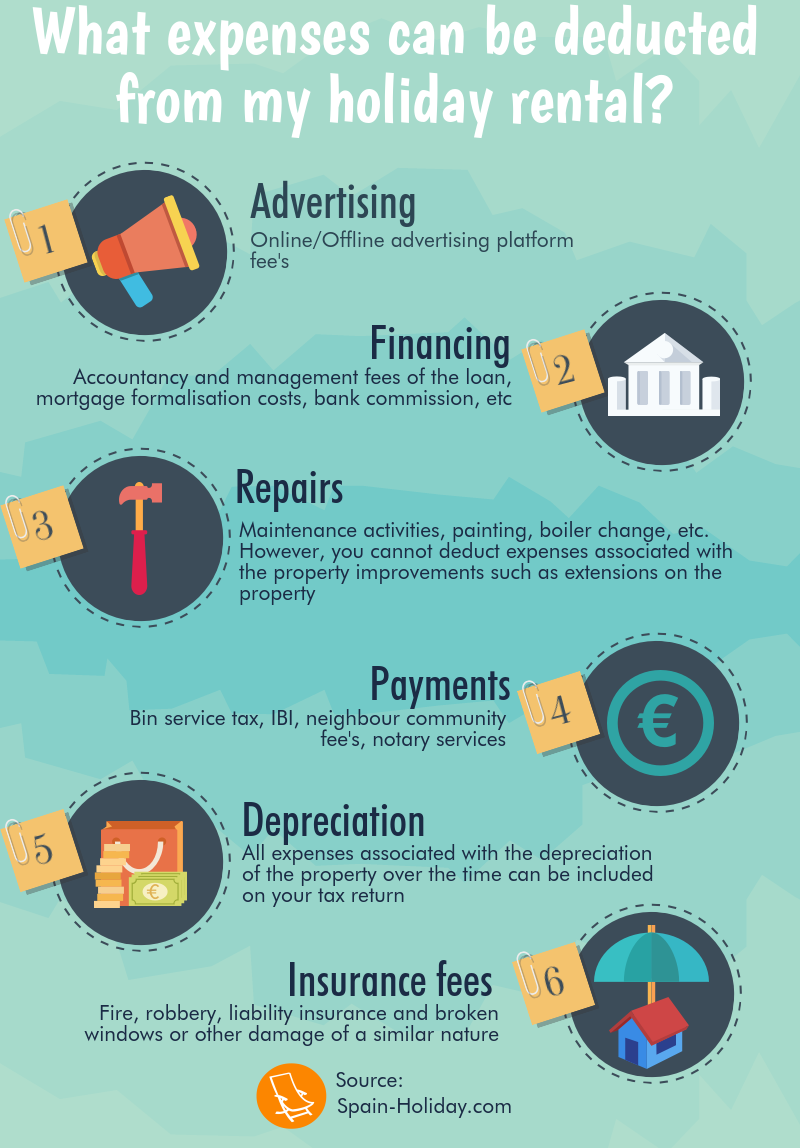Previously, we have covered how to declare income from a Spanish holiday rental. Taxpayers who own and rent out a holiday home will not be able to deduct the 60% of expenses associated with long-term rentals. They can, however, deduct a lot of other costs.
In this article we’re going to give you an overview of the deductible costs of owning a holiday home. These may be of interest to you if you’re the owner of a tourist holiday home in Spain or if you’re planning on renting out a property in the future.

Let's ask the Task Office
The Spanish tax office states that the costs which you can deduct from the total income earned from the rental property are the following:
a) All the costs required to ensure the turnover of profit (which includes interests and other financial costs, conservation and repair costs, non-state surcharges and taxes, but also rates and state taxes, doubtful assets, etc. ) and
b) The sums meant for depreciating the property and the assets transferred to the property, on the condition that they correspond to an effective depreciation, according to the determining legally terms.
Article 23.1 Law 35 / 2006 , 28 of November, 2006
In short, these are deductible costs such as notary services, IBI, power, water, bin service tax, property insurance, neighborhood community fee’s and property depreciation.
Deductible costs of a holiday home
*Publicity: you’re probably advertising your holiday rental property on a platform such as Spain-Holiday.com or a similar one. In this case, the advertising costs are deductible.
Financial costs: in other words, accountancy and management fees, loan arrangement fees, mortgage formalisation costs or various bank fees.
Renovation and repair costs: all the necessary adjustments to maintain the property such as installations, paint jobs and boiler replacement. Be careful with works or adjustments which upgrade the property since these are not deductible because they increase the purchase value.
Taxes, surcharges and charges: the IBI, bin service tax, monthly neighbourhood community fee’s.
Insurance contract premiums, that’s to say, covering for civil liability, fire, theft, broken windows or other damage of a similar nature.
Depreciation costs.
*All deductible costs are only valid for the amount of time which your property has been rented out during the calendar year. Advertising costs however, can be fully deducted regardless of the amount of time your property has been rented out.
Manresa Asesores, a consultancy based in Malaga, states that: “supposing that the property has not been rented out during the whole year then the deductible depreciation costs, the interests and other financial costs, the insurance premium costs, etc. all correspond with the number of days that the property has been rented out. In this sense, the tax office considers the days that the property has not been rented out, as days that there have been no reservations. With that in mind the property generates income for being at the owner’s disposal at a rate of 2% of the cadastral value (1.1% if the cadastral value has been checked by Direccion General de Catastro in the past 10 years) allocated proportionally according to the unoccupied days of the property.’’
Finally, due to the holiday rental nature of the property and the fact that the property is not considered a long-term rental or a permanent residence, Manresa Asesores reminds us that “it’s not possible to apply the 60% long-term rental reduction to these short-term holiday rental properties.''

